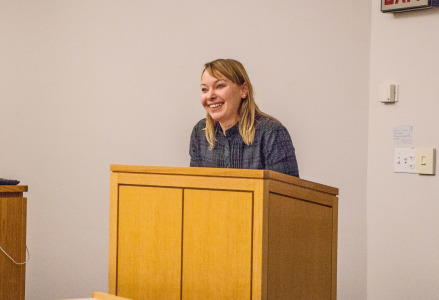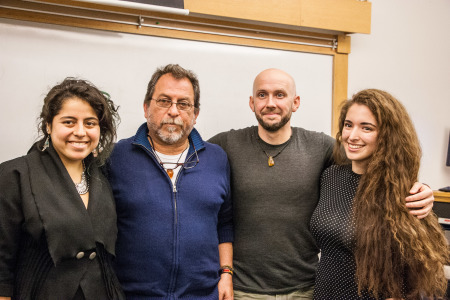
Last Tuesday, Nov. 11, the Cultural Films Committee hosted a talk by “Gasland: Part II” producer, Deborah Wallace, alongside a screening of the film, in an effort to create dialogue around art and activism.
“Artists should not act as activists,” Wallace said. “However, it does feel good that a movement can take a piece of art, like this film, and use it for the benefit of their own movement. I know that I would fail with my art if I started with the end result in mind. I just do it because I want to make art in the best way possible.”
Wallace also firmly believes in the power of storytelling and the powerful effects it can have on audiences.
“People rely on storytelling to change themselves,” she said. “People should also approach art with just telling a good story and doing that as well as they can.”
The “Gasland” films have received significant critical acclaim. Their strategy of using narrative to spark change has helped strengthen the movement against corporations who drill for natural gas.
“Gasland” was originally intended to be a 10-minute video. Eventually, it was made into a full-length film with a budget of less than $15,000.
According to Wallace, the focus of the first film was the process of natural gas drilling. But “Gasland: Part II” focused more on how the stakes of the natural gas drilling debate have been raised since the release of the last film.
Wallace told the audience that the crewmembers of the second film had three goals in mind for their project: to represent the science behind natural gas drilling, to look at government accountability through the close examination of the past seven presidential administrations and to focus on the narratives in the different neighborhoods where the film took place.
Wallace also took an opportunity to voice her disappointment with the recent elections throughout the country.
“About one-third of the population voted across the country,” she said. “You should feel better because roughly 50 percent of Iowans voted in last week’s election.”
Despite the fact that Iowa had a higher voter turnout than the rest of the country, Wallace urged the audience members to help create more dialogue around the pressing environmental issues and to vote for candidates who care about climate change.
Wallace said she believes that young people have the power to change the future of their country because they have the power to communicate effectively and mobilize quickly.
“Unfortunately, we don’t have the leaders we used to have. We don’t have Martin Luther King Jr. and we don’t have [Nelson] Mandela anymore. We don’t have those people that possess ‘sublime madness.’ The act of fighting radicals is more important than whether or not you’re going to win,” she said. “It is up to [the youth].”
Despite the mostly somber tone of her talk, Wallace took an opportunity to reflect on her time with the rest of the crewmembers during the process of filming the documentary.
“The documentary was a friendly experience because I got the chance to learn about and from others,” she said.
Although the documentary does not showcase the pristine beauty of a pastoral countryside, “Gasland: Part II” effectively tells the story of natural gas drilling in America today.



















































